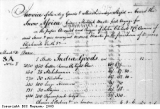Suppliers from outside Bristol
Towards the end of the 18th century, more and more firms from outside Bristol were supplying the Bristol slave ships and slave traders. For example, one of Bristol’s leading slave traders, James Rogers, purchased glass beads and cowrie shells from Robert Vigne, in London. These beads and shells for trade with West Africa came originally from Italy or Czechoslovakia and the Indian Ocean respectively. Thomas Phillips of Liverpool, provided Rogers with ‘coarse hats for the guinea trade’. The ‘guinea trade’, meaning the slave trade, was so-called after the area of the Guinea coast in West Africa.
The slave trader James Rogers also purchased trade goods from Samuel Galton, the Birmingham gun manufacturer. Galton was a supplier to various Bristol slave traders and had a warehouse in Bristol. He also invested in the voyage of the Bristol slave ship the Africa. Galton was a Quaker . Quakers were a religious group who prided themselves on their moral and ethical outlooks. They usually avoided involvement in industries that were seen as unethical, such as the slave trade. Galton, although a Quaker, was making and selling guns, and investing in the slave trade.
A major part of any slave ship’s trade cargo was textiles. The area around Bristol in Somerset and Gloucestershire produced woollen cloth. Woollen cloth was not in great demand in Africa, although some was traded. Merchants needed to buy cotton and silk which the traders in Africa would be interested in buying. These were not produced locally. Manchester was already a major producer of cotton textiles, and Bristol’s merchants were buying cloth from Manchester merchants. They were also buying cotton and silk textiles from India. These were imported into Britain by a company in London called the East India Company. This was a trading company whose members had control of all British trade with India and Asia. The East India Company controlled the very profitable trade in spices with what was known as the ‘Spice Islands’ (present day Indonesia). Bristol merchants had to buy the cotton cloth they wanted from the East India Company merchants in London.
Pictured here is an extract from the accounts book of the Bristol slave ship the Africa for a voyage in 1774. It lists the cotton cloth from Manchester and India, which was part of the cargo of trade goods taken from Bristol to West Africa.



